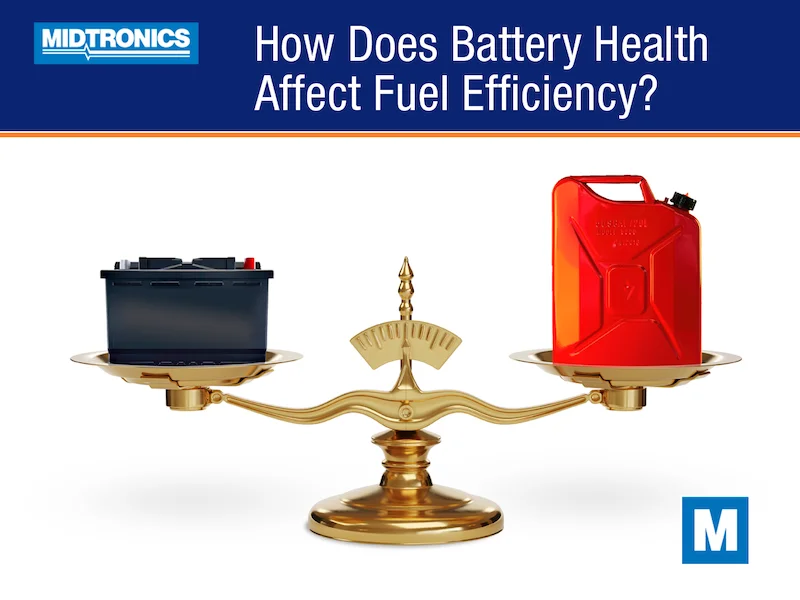In the realm of vehicle performance and efficiency, one aspect that often goes unnoticed is the connection between a vehicle’s battery health and its fuel efficiency. It might seem obscure, but there’s a definitive relationship between how well a battery is performing and the fuel economy the driver can expect.
This relationship plays a significant role in both the environmental impact of vehicle operation as well as the financial cost of ownership and usage, and it’s an area your customers may be keen to know as well. Explore how an ICE vehicle’s fuel consumption relates to battery health and what you can do with that information.
The Role of the Battery in an Internal Combustion Engine Vehicle
As an automotive professional, you’re well aware of how a 12-volt battery system works and what it does. A vehicle’s battery does more than just start the engine. It also powers all the electrical components of your vehicle, including headlights, windshield wipers, stereo systems, and charging ports. When your vehicle’s engine is running, the alternator charges the battery while also powering the vehicle’s electrical systems, and the battery’s energy is used as reserve power if there’s more demand than the alternator can provide in that instant.
A healthy battery ensures the alternator doesn’t have to work overtime to keep it charged. However, if the battery is weak or failing, the alternator has to work harder, which can lead to decreased fuel efficiency, but that’s just one way there’s an impact.
How Battery Health Impacts the Alternator’s Efficiency
A weak or failing battery places an extra load on the alternator. The alternator, in turn, consumes more fuel to generate extra electricity to keep the battery charged. This additional load on the engine, caused by a weakened battery, can significantly decrease the vehicle’s fuel efficiency.
In a perfect world, it takes approximately 1 horsepower for each 25 amps that an alternator generates. For a typical 100-amp alternator that’s working at about 50% capacity, it takes only 2 horsepower, which for a modern car with an average of 200 horsepower, is just 1% of its potential production. But when you factor in that normal acceleration and driving averages to less than 25% of a car’s potential – meaning most driving conditions use 50 hp or less – then that 2 hp now becomes much more of a factor. If the battery is weak and the alternator needs to generate more energy to keep up with the vehicle’s demands, it could sap as much as 2 miles per gallon more than it should.
On the other hand, a healthy battery contributes to optimal fuel efficiency. When the battery is in good health, the alternator doesn’t need to exert extra effort to keep it charged, thus conserving fuel.
The Effect on Automatic Start-Stop Systems
We’ve previously mentioned that automatic start-stop technology that’s found in a vast majority of modern cars is dependent on battery health. When a car comes to a complete stop, the engine shuts off automatically while the vehicle is in gear to conserve fuel rather than idling. With all of the accessories and electrical functions still operating, the vehicle’s systems monitor for a voltage drop, then it restarts the vehicle when it hits the threshold. Typically, it can last 30 to 90 seconds, although it depends on the electrical system load.
But if the battery is struggling to recharge quickly after a start event, or if the overall battery capacity has degraded, you’ll notice differences in how auto start-stop functions. It might only shut off for a few seconds, or it might not shut off at as many stops as you’d previously experienced. And in many cases, an early warning sign of a bad battery is when the auto start-stop feature works seldom or not at all anymore.
The Economic and Environmental Impact of Improved Fuel Efficiency
Improved fuel efficiency due to good battery health has both economic and environmental benefits. Economically, better fuel efficiency translates into lower fuel costs. Over time, these savings can be substantial, making the investment in regular battery diagnostics worthwhile.
Environmentally, improved fuel efficiency means less fuel consumption, leading to reduced emissions. Lower emissions contribute to cleaner air and help combat climate change, making a vehicle more eco-friendly.
A Real-World Case Study
Edmunds performed a real-world test on three vehicle models to verify the difference in efficiency when auto start-stop was engaged vs disabled. The results, measured while using the vehicles under normal operating conditions, might be surprising. The fuel economy savings varied from between 9.5 and 10.9% on the three models when the system was engaged.
Add to that the impact from an alternator’s strain as it attempts to keep up, and you could be looking at between 12 and 15% more fuel consumption when a bad battery is present, and that doesn’t account for other non-fuel-related issues that might occur too.
Regular Battery Diagnostics: A Proactive Approach
How does this factor into everyday operations at an auto repair facility?
- It provides an opportunity for education-based campaigns. When vehicle owners are aware that a weak battery can cost them even more money in the long run, there’s a higher likelihood they’ll be receptive to testing – and even ask for it. Your marketing can benefit from this information.
- It can provide hints for diagnosis. If a customer is concerned about deteriorating fuel efficiency with no other obvious symptoms, service advisors or technicians can first ask whether the customer has noticed auto start-stop operation differences, or they can test for it themselves.
- It opens the conversation about proper high–quality batteries. When a battery needs to be replaced, vehicles with auto start-stop require dependable performance of EFB and AGM batteries.
To ensure your battery remains healthy, regular diagnostics are crucial. Routine battery checks can help identify potential issues before they escalate into serious problems. Advanced diagnostic tools can accurately assess the condition of a battery and provide insights into necessary maintenance or replacement. This proactive approach to battery health can save drivers significantly in terms of both fuel costs and potential battery replacement.




